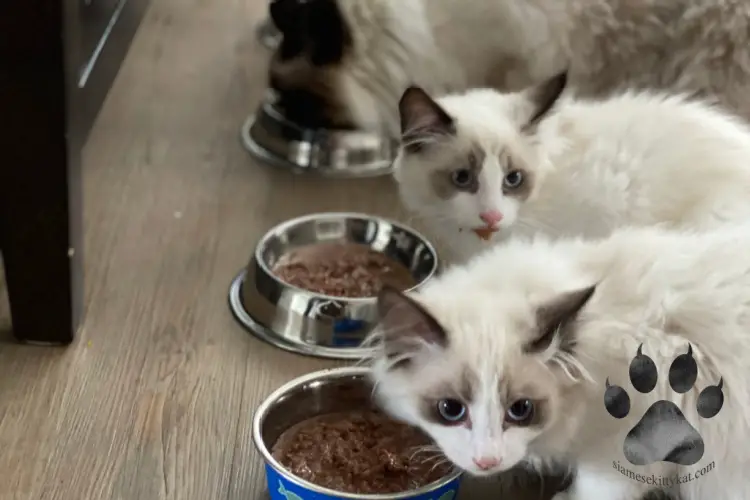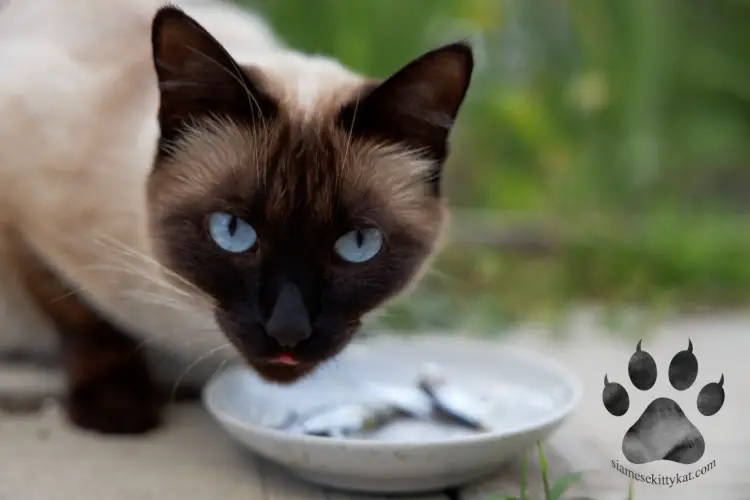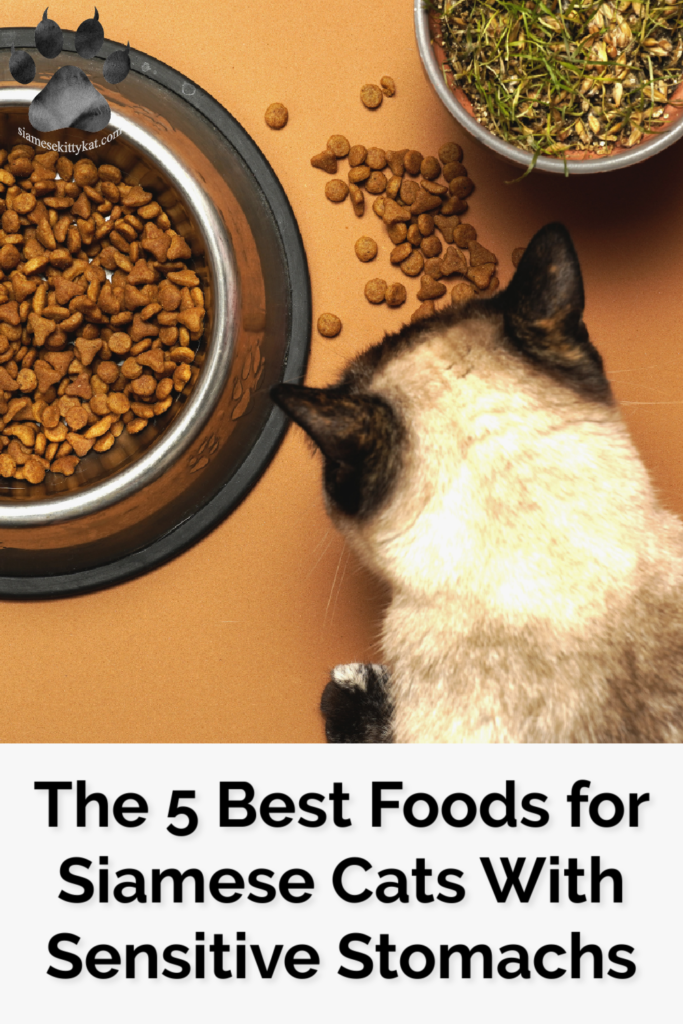All cats have some form of sensitivity when it comes to food. Feeding your Siamese the right diet is a lot more complicated than we are first led to believe.
While most seem “fine” with a typical dry food diet, it’s not until certain health problems begin to pop up that you realize they need much more.
Refusing to eat, licking their lips, and vomiting are all signs of an upset stomach. If your Siamese often vomits without bringing up a hairball, there is a high chance that something much bigger is at play.
Siamese cats with sensitive stomachs are best fed with chicken that’s boiled, deboned, and cut into small chunks. But the best food for your Siamese cat can still vary depending on their age, health condition, and of course, their preference.
Siamese cats aren’t like any other cat (no kidding, huh?) when it comes to the way they eat. Due to their unique jaw structure, they even chew differently than other felines.
Due to many questions and theories thrown my way about Siamese cats and their sensitive little stomachs, I decided to write an in-depth guide highlighting everything you need to know about the issue.
Here, you will find the signs, most common causes, the right diets, as well as some ways to soothe those grumbling tummies.
Why do Siamese cats have sensitive stomachs?
There are quite a few reasons why your cat may be suffering from a sensitive stomach. Stress, diet changes, and medication are all common causes.
That being said, for Siamese cats, it’s usually down to food intolerances or allergies. Siamese cats, especially ones that are mixed or crossed, are genetically at higher risk for developing these allergies.
Food intolerance and allergies are caused by a reaction to certain ingredients, typically protein. This is sometimes known as an ‘adverse reaction to food,’ which is an abnormal response to a food additive.
There are two versions of this:
It could be months or even years until these allergic reactions happen. But, once your Siamese responds negatively to a certain food, they will continue to do so.
Here are some things to know about adverse reactions to food occurs:
Unfortunately, it can be quite difficult to pinpoint the cause of a sensitive stomach. It usually comes down to the food you are feeding them and a problem with their protein intake.
The good thing, however, is that with the right changes, food allergies and intolerances can be overcome. It will just take some trial and error on your part.
Does my cat have food allergies or an intolerance?
It’s rather likely that a sensitive stomach is down to food allergies or food intolerance. Of course, you should always get your Siamese checked out by a vet in case there are any underlying health problems.
These are the signs your Siamese has food allergies:
If your Siamese has a severe case of allergies, they may over-groom so much that they end up tearing out their own hair or breaking the skin.
Food intolerance is different from allergies, and if you suspect your Siamese has a sensitive stomach, this is usually the reason.
Signs your Siamese has food intolerance include:
These two symptoms can be signs of much bigger health concerns. Therefore, you should always get your Siamese checked out, especially if any other symptoms begin to show.
The most common food that triggers allergies include:
Looking at this list, you can see why food allergies are so common. All of the foods above are incredibly common ingredients, therefore it is important to mix up your cat’s diet every now and then to avoid developing these intolerances.
Does stress cause an upset stomach?
Just like us humans, when your Siamese is stressed, this could result in an upset stomach.
Siamese cats especially suffer from separation anxiety and are often the cause of a tummy ache. The same can be said if they are going through any environmental changes such as moving house or welcoming a new member into the household.
If you suspect your Siamese is feeling stressed or anxious, try to pinpoint the reason and see if that fixes their upset stomach.
Other causes of sensitive stomachs include:
What health conditions cause sensitive stomachs in felines?
Sometimes, the problem goes a lot further than stress factors and food allergies. For this reason, you should never ever skip an annual check-up. For kittens and senior cats, this should be done twice a year.
Research shows that a high percentage of cat owners skip wellness checks, especially those who own indoor kitties. Not only do these checkups save you money in the long run, but they can also save your Siamese from developing serious diseases.
If your Siamese is vomiting several times a day and refuses to eat food over a 48 hour period, you should get them checked out as soon as possible. They might have ingested something toxic to them such as chocolates.
Even if your Siamese is vomiting every so often without bringing up a hairball, you should still make an appointment to ensure nothing serious is going on.
Here are some health issues linked to a sensitive stomach in felines:
- Adenocarcinomas
Adenocarcinomas is a cancer found in the small intestine. This can cause a whole range of digestion issues. Due to Siamese genes, they are more likely to develop cancer than your average moggie.
- Esophageal Hypomotility
This disease causes weak muscular activity. While it may not seem linked to stomach issues at first, this can cause your Siamese problems when passing food through their gullet.
- Pyloric Stenosis
This disease especially affects young Siamese kittens. It causes the stomach to narrow, making it almost impossible to digest food well. This usually results in gastric distention and vomiting.
- Intestinal Worms
Intestinal worms are common in most felines that spend time outdoors. As most Siamese owners like to keep their kitties indoors, this is usually not much of a concern, however, fleas can find their way into the home.
Tapeworms are usually the biggest culprits when it comes to intestinal worms. Tapeworms develop when a flea eats the egg of a tapeworm. From then, your kitty may accidentally eat flea larvae when grooming or biting their skin.
These tapeworms then hatch inside your Siamese and attach themselves to the intestinal lining.
- Hepatic Amyloidosis
Hepatic Amyloidosis is a very uncommon disease, so there is a high chance your Siamese isn’t suffering from this. However, this does cause nausea and vomiting, which is often linked to sensitive stomachs.
How to prevent feline diarrhea
Diarrhea is horrible for both you and your Siamese. If your Siamese suffers from an upset stomach, diarrhea can happen quite often.
To avoid diarrhea you should:
If your Siamese has diarrhea, you could try some of these home remedies:
What is considered a good diet?

Just like us, humans, cats require a balanced diet filled with all the right nutrients to stay healthy.
However, unlike us, cats are obligate carnivores, which means they need to consume a large amount of meat and animal-based proteins. Plant-based proteins such as vegetables and grains are a lot harder for them to ingest due to a lack of enzymes.
While it is definitely not recommended for dogs to eat an all-vegetarian diet, it is possible. If you try the same thing with cats, they’ll develop a huge list of health issues.
A deficiency of taurine, one of the most important nutrients found in meat, can cause heart problems and blindness in cats.
Of course, a lack of meat will also cause your Siamese to have a very upset stomach.
It’s also a good idea to take into consideration how many carbohydrates your Siamese is consuming. In the wild, cats live on a very high protein diet, with as little as 1-2% of carbohydrates.
On average, dry food contains around 35-50% carbohydrates. Since our kitties weren’t made to consume such a large amount, their stomachs and overall health will suffer.
Even if your Siamese is drinking lots of water, chances are they are still not consuming enough if you are feeding them a dry food diet.
The biggest and perhaps most important aspect of a healthy diet is water intake.
Cats usually eat prey that contains around 70 -75% water. Dry food contains as little as 5-10%, whereas wet food contains around 78%. As you can see, a wet food diet is highly beneficial compared to a dry food one.
Even if your Siamese drinks double the amount of water on a dry food diet than they would on a wet food diet, studies show that they consume less than half the amount needed.
Since your Siamese is suffering from a sensitive stomach, there are a lot more things you need for a balanced diet:
Give your Siamese variety
While it may seem like wet food is the way to go, there are also benefits to dry food. This is why most pet parents, myself included, choose to feed their cats a mix of both wet and dry food.
Benefits of dry food include:
Wet food is useful when it comes to:
Elimination diet
If you suspect that your Siamese is having a bad reaction to a specific ingredient, you will have to try the elimination diet. These diets are also referred to as ‘hypoallergenic diets.’
This is basically the process of identifying which ingredients trigger your cat’s allergic reaction. The new diet should not include any proteins you previously fed them. For example, if you’ve been feeding your Siamese food which contains beef, you should not feed them beef anymore.
It may take you a few trial runs to find something that works. I recommend starting off with either white or red meat, and if there is no improvement after the first trial, switch to the other.
Keep in mind this doesn’t just mean their meals. This includes treats, food toppings, and even flavored toothpaste. You must only feed your Siamese one protein in order to pinpoint the issue.
Take me and my experience for example. Seemingly out of nowhere, my Siamese began throwing up after every meal. I was confused as to why, since I had been feeding him the same wet food for years and never had any problems.
I went to the vet for his opinion, and he told me that my Siamese may have developed an allergy to the food I had given him. So, I decided to change up his food in an attempt to fix the problem.
I tried beef, pork, lamb… everything you can imagine. Previously, I had been feeding him food with chicken, so it seemed like that wasn’t the problem.
I took a trip to the vets once again where he asked me if I had been feeding my Siamese treats. As soon as he said that, it was like a light switch flicked in my head!
As soon as I went home, I checked the ingredients on the treats. Just as I expected, the treats contained chicken! Once I eliminated these treats and fed my Siamese only one protein, I was able to identify that chicken was the problem.
The entire trial will last 6 – 8 weeks, so you must pick something you know they can eat comfortably. Even if your Siamese refuses to eat for as little as 24 hours, this could have a detrimental effect on their health.
The reason the trial takes such a long time is to allow the skin to normalize after the food allergen has been removed. A trial that lasts 8 weeks will identify 95% of food allergies, whereas a 4-week trial will identify less than half.
If you’re having trouble figuring out the correct diet for your Siamese, you should contact your vet for assistance.
Tips to help the trial run smoothly:
How do I switch my Siamese cat to new food?

When switching to a new food, you should always integrate it into their diet gradually. This will usually take a few weeks.
Cats, especially Siamese, are creatures of habit. Therefore, they most likely won’t take kindly to suddenly switching up their food. If you rush the transition, they will simply avoid eating it.
Suddenly switching the food will also upset their sensitive stomachs, causing vomiting or diarrhea.
If your Siamese is especially finicky, it may even take longer for you to go through the process. However, this is the plan I used when switching my Siamese to a new diet:
Day 1 – 4: Give them a small amount of the new food in a separate bowl.
Day 5 – 10: Decrease the old food and increase the new.
Day 10 – 15: Remove the old food
If you’re having trouble with the transition, you should contact your vet for assistance.
5 Best Foods for Siamese Cats with Sensitive Stomachs
Below I have listed 3 homemade foods as well as 2 store-bought foods to help with your kitties’ bad tummy.
1. Pumpkin
Yes, cats can eat pumpkins! It has many health benefits when prepared correctly:
You should feed your Siamese 100% canned pumpkin without any added sugar, additives, fibers, and spices. For adult Siamese cats, you can feed them ½ – 1 teaspoon per day, mixed into their food.
Do not give your Siamese pumpkin pulp, stem, raw pumpkin, or the skin of a pumpkin. Contact your vet beforehand.
2. Boiled Chicken And White Rice
Rice and boiled chicken are great for cats with sensitive stomachs and diarrhea. The fiber in the rice will help firm the stool and the chicken will give a good source of fiber.
The chicken should be deboned, boiled, and cut into small chunks. Don’t season the chicken or add unnecessary flavors.
Rice and chicken should only be reserved when your Siamese is having a gastric episode. Cats will soon become bored of the bland taste and the high fiber content can cause health complications in the long run.
3. Boiled Eggs
While boiled eggs aren’t linked to a sensitive stomach, they are great for replacing any animal proteins and energy lost due to vomiting and diarrhea.
Here are a few ways in which boiled eggs are beneficial to cats”
Never, ever feed your Siamese raw eggs and only give them boiled eggs once or twice a week. The egg should also be broken up into small pieces.
4. Blue Buffalo Sensitive Stomach Chicken Recipe
After reading many forums and reviews online, this dry food from Blue Buffalo seems to help with many kitties’ sensitive stomachs. Chicken is the primary source of protein, which promotes strong muscles.
This food is also packed with probiotics which support a healthy stomach and a better digestive system. It also contains amino acids, fatty acids, and omegas to promote good health.
5. Science Diet Sensitive Stomach & Skin
This food comes in both wet and dry. It has no artificial flavors, colors, or preservatives that usually upset your cat’s stomach. It contains lots of vitamin E to keep their fur glossy and their skin healthy.
Other thing you can do to help a sensitive stomach
Here are some more things you can do to support a sensitive tummy:
- Regular deworming treatments
To avoid any upset stomachs due to parasites, you should keep up to date on your Siameses’ deworming treatments. Even if they are indoor cats.
- Regular vet visits
As I mentioned before, it is important to take your cat to the vet to get their yearly wellness checks. This will catch any diseases before develop further.
- Brush your cat regularly
Cats who have sensitive stomachs often have so due to a large intake of hair. Grooming them regularly will decrease the amount of hair that ends up in their tummy.
There are a whole list of reasons why your Siamese could be suffering with a sensitive stomach. While it is usually linked to the food they are eating, typically a food allergy or intolerance, it can also be due to stress or environmental chances.
Always contact your local vet before switching up their diet, and always slowly introduce the new food over a couple of weeks.
Try the elimination diet to ensure your Siamese isn’t allergic to any certain proteins such as dairy or chicken.
And remember, the whole process is as stressful for your Siamese as it is for you – so give them lots of love while you figure it out!
Get your FREE Siamese Cat 2026 Printable Calendar

